17.4.2
- 2025 Ocean Action Symposium
海洋素養與適能
What is your vision of "ocean literacy"? Ocean literacy is more than just textbook knowledge; it's a way of looking at the world—it influences our values and shapes our motivation to act. Have you ever considered this? Every breeze, every current, every ship, every story of the sea—they are inextricably linked to our lives and culture. How do Taiwan's tides and ocean currents affect residents of the island and its outlying islands? How have shipbuilding and navigational technology shaped Taiwan's unique maritime culture? And what significance do coral conservation efforts have for the marine environment? This year's symposium invited scholars from across disciplines, educators on the front lines, representatives from the marine restoration industry, and marine cultural activists to share their insights! The symposium focused on themes of science communication and popular science education, marine culture and island society, and social participation and marine restoration.
Sustainable Impact:The "Ocean Literacy" symposium redefines ocean awareness as more than academic knowledge—it is a worldview that connects science, culture, and action. The event invited interdisciplinary experts, educators, and marine restoration practitioners to explore three key themes: science communication and public education, marine culture and island society, and social participation in ocean restoration.Through discussions on topics such as coral conservation, shipbuilding traditions, and community-based marine stewardship, the symposium encouraged participants to view the ocean as an integral part of life and identity.This initiative not only enhances public understanding of marine sustainability but also strengthens collaborations among academia, education, and industry.It exemplifies SDG 14 (Life Below Water) by promoting ocean conservation awareness, and SDG 17 (Partnerships for the Goals) by fostering multi-sector partnerships for sustainable ocean development and education.
你對「海洋素養」的想像是什麼? 海洋素養,不只是課本上的知識,更是一種看待世界的方式——它關係著我們的價值觀,也形塑了我們的行動力。 你有想過嗎?每一次吹來的海風、流動的洋流,每一艘航行的船隻、每一段海上故事,都與我們的生活與文化息息相關。台灣的潮汐與洋流,如何影響本島與離島的居民?造船與航海技術,如何塑造出台灣獨特的海洋文化?珊瑚保育的努力,對海洋環境又有什麼意義? 今年的座談邀請跨領域的學者、站在第一線的教育者、致力海洋復育產業代表與海洋文化行動者,帶來精彩的分享! 座談會主題聚焦在——科學溝通與科普教育、海洋文化與島嶼社會、社會參與與海洋復育
永續影響力:本次「海洋素養」主題座談強調從教育、文化、產業與社會參與等面向深化全民的海洋意識。活動以「你對海洋素養的想像是什麼?」為引言,鼓勵民眾重新思考海洋與人類生活的連結,將海洋視為理解世界與行動的出發點。座談邀集跨領域專家,包括海洋教育學者、文化研究者、海洋復育產業代表及第一線教育工作者,探討「科學溝通與科普教育」、「海洋文化與島嶼社會」及「社會參與與海洋復育」三大主題。內容涵蓋從海洋環境保育、珊瑚與生態修復、航海與造船文化,到地方社會行動等多層面議題。此座談會透過多元對話與知識交流,深化社會大眾對海洋永續的理解,並強化學術、教育與產業間的夥伴合作,實踐 SDG 14(保育與永續利用海洋資源) 與 SDG 17(強化全球夥伴關係) 的精神,推動從知識、文化到實踐的「海洋公民素養」。
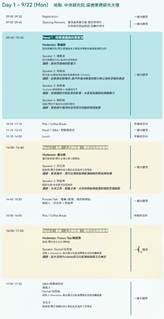
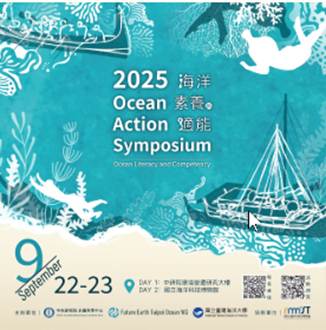
Evidence: https://www.oceanactionsymposium2025.com/
- Design of marine energy systems
海域再生能源系統設計(課程)
This course focuses on wind turbine systems, starting with the fundamentals of wind energy theory. It gradually introduces students to wind potential assessment, site selection principles, the evolution of wind turbine design (from land-based fixed to offshore floating), and the key components and operational mechanisms of wind turbine systems. The course emphasizes the integration of theory and practice, incorporating experimental data collected from actual wind sites to conduct wind condition analysis and system performance evaluation, fostering students'' understanding of the architecture and operational characteristics of wind-to-grid integrated systems. Furthermore, the course covers practical topics such as wind power industry chain development trends, wind control strategies, maintenance technologies, and wind turbine weatherization design. In response to Taiwan''s policy push for offshore wind power, the course will also explore the challenges faced at each stage of wind farm development (such as regulatory review, environmental assessment, construction and installation, and operations and maintenance). This aims to cultivate students'' cross-disciplinary analytical skills and environmental sustainability thinking, strengthening their abilities in engineering planning and social communication. This course is suitable for students interested in renewable energy, marine engineering, and sustainable development. After completing this course, they will have the basic skills to enter the wind power industry or related research fields.
Sustainable Impact:This course centers on wind power systems, guiding students from fundamental wind energy theory to practical applications such as site assessment, turbine design, and system performance evaluation.By integrating real-world wind farm data, students analyze wind conditions and assess system efficiency, gaining hands-on understanding of wind-to-wire integration and offshore wind development challenges.The course also explores industry trends, maintenance technologies, and environmental considerations, aligning with Taiwan's offshore wind energy policies.Students develop interdisciplinary competencies in renewable energy engineering, sustainability analysis, and professional communication.Overall, the program supports SDG 7 (Affordable and Clean Energy), SDG 4 (Quality Education), and SDG 17 (Partnerships for the Goals) by cultivating skilled talent and fostering international collaboration in the renewable energy sector.
本課程以風力發電系統為主軸,從風能基礎理論出發,逐步帶領學生認識風力潛能評估、場址選擇原則、風力機設計演進(從陸域固定式至離岸浮動式)、以及風力發電系統之主要組件與運作機制。課程強調理論與實務結合,導入實際風場所蒐集之實驗數據,進行風況分析與系統效能評估,培養學生理解風能至電網(wind-to-wire)整合系統架構與運作特性。此外,課程亦涵蓋風電產業鏈發展趨勢、風力控制策略、維運技術、及風機耐候設計等實務議題。為呼應我國推動離岸風電政策之需求,課程亦將延伸探討風場開發各階段(如法規審查、環境評估、施工安裝、營運維護)所面臨之挑戰,培養學生具備跨領域分析與環境永續思維,強化其在工程規劃與社會溝通之能力。本課程適合對再生能源、海洋工程與永續發展有興趣之學生選修,修課後將具備進入風電產業或相關研究領域之基礎能力。
永續影響力:本課程以「風力發電系統」為主軸,從風能理論、風場潛能評估、風機設計到產業鏈實務發展,全面培育學生在再生能源領域的理論基礎與應用能力。課程導入實際風場所蒐集的數據,讓學生進行風況分析與系統效能評估,並探討風電從陸域到離岸的演進與挑戰。課程除涵蓋風電控制策略、維運技術及耐候設計外,亦融入國家離岸風電政策與法規審查、環評、施工及維運等跨域內容,強化學生在工程、政策與社會永續間的整合思維。本課程培養學生具備風能產業入門所需的專業能力與跨領域溝通技巧,實踐SDG 7(可負擔的潔淨能源)、SDG 4(優質教育)與SDG 17(促進國際合作與永續夥伴關係),展現學校在推動綠色能源教育及永續發展上的努力。

Evidence:
https://usr.ntou.edu.tw/var/file/90/1090/img/1658/158130463.pdf
https://usr.ntou.edu.tw/var/file/90/1090/img/1658/181052905.pdf
- Marine Engineering and Maritime Practice Lectures-Industrial Gas Application Overview
輪機及海運實務講座-工業氣體應用概述
Industrial gases are high-purity gases widely used in industry due to their unique properties. They include oxygen (O2), nitrogen (N2), carbon dioxide (CO2), helium (He), argon (Ar), and hydrogen (H2). They are commercially produced through various methods, such as atmospheric separation, chemical reactions, and extraction from natural resources. Industrial gases are widely used in combustion processes, metal manufacturing, food packaging, electronics manufacturing, chemical production, pharmaceutical formulations, and fuel extraction. Industrial gases are safe, versatile, and environmentally friendly substances that can save costs, prevent spoilage, improve product quality, and increase the efficiency of industrial processes. Furthermore, the growing emphasis on renewable energy sources is boosting demand for industrial gases, which are widely used in fuel cells (H2), energy storage systems (N2), and alternative fuel (O2) applications.
Sustainable Impact: Industrial gases—such as oxygen, nitrogen, hydrogen, and carbon dioxide—play a crucial role in the global transition toward clean and renewable energy. Their applications in fuel cells, energy storage systems, and alternative fuels contribute directly to improving energy efficiency and reducing carbon emissions. When incorporated into university curricula or training programs, these topics provide valuable educational content that supports awareness and practical understanding of the UN Sustainable Development Goals (SDGs).
At National Taiwan Ocean University, the study and discussion of industrial gas technologies foster students’ knowledge of sustainable energy systems, industrial decarbonization, and environmental responsibility. This initiative aligns with SDG 17.4.2 — Education supporting the Sustainable Development Goals, demonstrating the university’s commitment to integrating sustainability education into academic and professional development contexts.
工業氣體是指高純度氣體,因其特殊性能而被廣泛應用於工業領域。它包括氧氣(O2)、氮氣(N2)、二氧化碳(CO2)、氦氣(He)、氬氣(Ar)和氫氣(H2)。它們通過各種方法進行商業生產,如大氣分離、化學反應和從天然資源中提取。工業氣體廣泛用於燃燒過程、金屬製造、食品包裝、電子製造、化工生產、藥物製劑和燃料提取。工業氣體是一種安全、多功能和環保的物質,可節約成本、防止變質、改善產品品質並提高工業過程的效率。 此外,對可再生能源的日益重視也促進了對工業氣體的需求,這些氣體被廣泛應用於燃料電池(H2)、儲能系統(N2)和替代燃料(O2)應用中。
永續影響力:工業氣體如氧氣、氮氣、氫氣與二氧化碳等,在清潔能源轉型與再生能源應用上扮演關鍵角色。其應用涵蓋燃料電池、儲能系統與替代燃料,直接促進能源效率與碳排減量。此主題若納入課程或研討活動,可作為教育永續發展目標(SDGs)的重要素材,特別有助於推廣永續產業與低碳技術知識。國立臺灣海洋大學透過探討工業氣體的應用與永續價值,培養學生對能源科技、產業減碳與永續發展的理解與實踐能力,符合 SDG 17.4.2 教育支持永續發展目標 的精神,強化學校作為推動跨領域永續教育與知識傳播的平台。
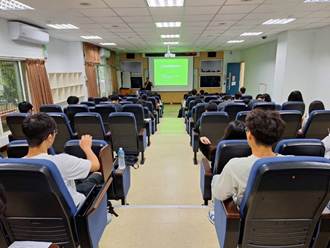

Evidence:
https://usr.ntou.edu.tw/var/file/90/1090/img/1658/744895960.pdf
- Marine Engineering Practice Lecture - Future fuel developments on board ships
輪機實務講座-船上未來燃料發展
Future marine fuel development is moving toward zero-carbon fuels such as ammonia, methanol, hydrogen, and biofuels to achieve the International Maritime Organization's (IMO) carbon neutrality goals. While liquefied natural gas (LNG) is currently considered an important transition fuel, ammonia and methanol offer significant long-term potential, with green methanol and e-ammonia emerging as key areas of development. Fuel development faces challenges in terms of cost, infrastructure, and safety. It also requires relevant skills training for crews and the development of port refueling systems.
Sustainable Impact: As the International Maritime Organization (IMO) advances toward global carbon neutrality, marine fuel development is shifting toward zero-carbon alternatives such as ammonia, methanol, hydrogen, and biofuels. This transition raises complex challenges in cost, safety, infrastructure, and crew training, offering significant educational and research opportunities.
National Taiwan Ocean University integrates these emerging fuel technologies into its academic and professional training programs, helping students understand the science, engineering, and policy dimensions of maritime decarbonization. Through courses, seminars, and applied projects, students gain practical insight into sustainable energy systems and international environmental governance.
This initiative exemplifies SDG 17.4.2 — Education supporting the Sustainable Development Goals, by equipping future maritime professionals with the knowledge and skills to contribute to green shipping, renewable energy innovation, and global sustainability transitions.
船上未來燃料發展正朝著氨(氨)、甲醇、氫氣與生質燃油等零碳燃料方向發展,以達到國際海事組織(IMO)的碳中和目標。 LNG目前被視為重要過渡性燃料,但長遠來看氨和甲醇潛力較高,綠色甲醇和電子氨(e-ammonia)為重要發展方向。 燃料發展面臨成本、基礎設施和安全挑戰,同時也需要為船員進行相關技能培訓,並將於港口進行加注系統開發。
永續影響力:國際海事組織(IMO)推動航運業邁向碳中和目標,船舶燃料正朝氨、甲醇、氫氣與生質燃油等零碳燃料發展。此趨勢涉及能源轉型、工程安全、港口基礎設施及船員專業培訓等多重議題,具高度教育與研究價值。國立臺灣海洋大學以此為教育主題,結合課程、研討與實務訓練,引導學生了解零碳燃料的原理、挑戰與全球政策脈動,培養具前瞻視野的海事與能源人才。此舉落實 SDG 17.4.2 教育支持永續發展目標,促進學生對永續能源、綠色航運與國際合作的整體理解,強化高等教育在推動永續轉型中的關鍵角色。
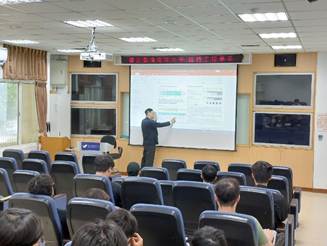

Evidence:
https://usr.ntou.edu.tw/var/file/90/1090/img/1658/683686407.pdf
- Sustainable Environment Planning and Design 環境永續規劃與設計(課程)
This course covers an introduction to the United Nations Sustainable Development Goals (SDGs), an introduction to and discussion of the Voluntary Review Reports (VLRs) for Taiwan''s counties and cities, an introduction to Environmental, Social and Corporate Governance (ESG) and industry cases, the impact of dam removal on river restoration, the National Water Environment Improvement Plan, ecological engineering methods and wetland management, reservoir management and public participation, and low-carbon green cities.
Sustainable Impact: This course focuses on the United Nations Sustainable Development Goals (SDGs), introducing their global framework, Taiwan’s Voluntary Local Reviews (VLRs), and practical applications in Environmental, Social, and Governance (ESG) practices. Topics include dam removal and river restoration, national water environment improvement programs, ecological engineering, wetland management, reservoir governance, and low-carbon city initiatives.
Through interdisciplinary lectures and case discussions, students gain a comprehensive understanding of sustainability governance, environmental management, and social responsibility. The curriculum equips participants with the analytical and practical skills needed to apply sustainability concepts in both policy and industry contexts.
This initiative exemplifies SDG 17.4.2, which emphasizes education for sustainable development and the integration of SDG principles into university-level teaching to build future leaders capable of advancing global and local sustainability agendas.
本課程內容涵蓋聯合國永續發展目標(SDGs)概論,台灣各縣市自願檢視報告(VLR)導讀與討論,環境、社會與企業管理(ESG)簡介與產業案例,拆壩對河川復育的影響,全國水環境改善計畫,生態工法與溼地經營管理,水庫經營與民眾參與,低碳綠色城市等主題。
永續影響力:本課程以聯合國永續發展目標(SDGs)為核心,涵蓋SDGs概論、台灣各縣市自願檢視報告(VLR)導讀與討論、ESG永續管理及產業案例、水環境改善與生態工法、水庫經營、低碳綠色城市等主題。課程設計結合理論與實務,協助學員理解永續治理架構及其地方實踐,培養分析政策、環境與社會議題的綜合能力。此課程具體落實 SDG17.4.2 所強調的「透過教育推廣永續發展目標」宗旨,強化師生對全球與在地永續行動的認知與參與。
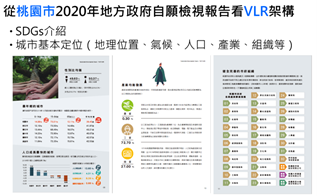

Evidence:
https://usr.ntou.edu.tw/var/file/90/1090/img/1658/592738196.pdf
https://usr.ntou.edu.tw/var/file/90/1090/img/1658/553845031.pdf
- 2024 The 2nd Sustainability Innovation Practice Competition 2024第二屆永續創新實踐競賽
This event is the "2024 Second Innovation and Sustainable Practice Competition" organized by the University System of Taipei (USTP), which includes National Taiwan Ocean University, National Taipei University, National Taipei University of Technology, and Taipei Medical University. The competition aims to deepen students' understanding and practice of the Sustainable Development Goals (SDGs), encouraging students to propose innovative solutions for sustainability issues. This indicator assesses the specialized courses or activities offered by universities focusing on sustainable development and the SDGs. The competition, serving as a structured educational practice program, reflects the university's commitment to SDG education, aiming to teach the next generation how to implement sustainable development in their lives.
SDGs relevance: SDG17 Partnerships for the Goals
該活動是臺北聯合大學系統,由國立臺灣海洋大學主辦,國立臺北大學、國立臺北科技大學、臺北醫學大學等共同協辦的「2024 第二屆 創新.永續實踐競賽」。競賽旨在深化學生對聯合國永續發展目標(SDGs)的認知與實踐,鼓勵學生針對永續議題提出創新解決方案。該競賽作為一個結構化的教育實踐方案,體現了大學在SDG教育方面的投入,以教導下一代在生活中實踐可持續發展
與SDG的關聯性: SDG17促進目標實現的夥伴關係

Evidence:
https://mprp.ntou.edu.tw/p/404-1017-105909.php?Lang=zh-tw
https://ustp.ntpu.edu.tw/info/6/method/167
https://ustp.ntpu.edu.tw/info/6/method/166